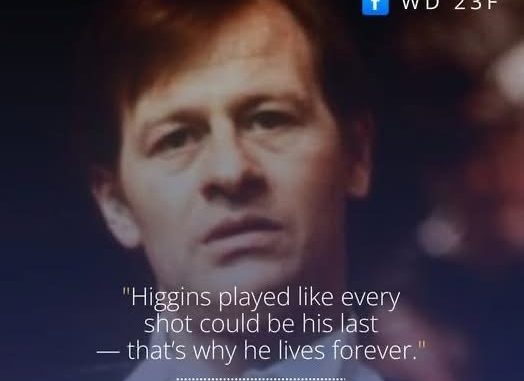
Alex Higgins played snooker like every shot could be his last — reckless, fearless, and bursting with raw emotion. He wasn’t interested in safety shots or playing it safe; he lived on the edge, and he dragged the audience right there with him. Every time he leaned over the table, you could feel the tension — was it going to be genius or disaster? That was the beauty of Higgins: he made snooker unpredictable, alive, and utterly human. He fought his demons on and off the table, but inside the arena, he was pure electricity. That’s why fans didn’t just watch him — they lived through him. Higgins gave the game his fire, and in return, the people gave him immortality.
Born in Belfast in 1949, Higgins was never destined for an ordinary life. From a young age, he carried himself with a restless spirit, a sense that rules were there to be bent if not broken outright. By the time he stormed into the professional snooker world in the early 1970s, he already had a reputation: part prodigy, part rebel, and all showman. His nickname, The Hurricane, wasn’t given lightly — he attacked frames at breakneck speed, blowing away opponents who couldn’t cope with his pace or unpredictability.
Higgins didn’t just win matches; he made them into theater. Crowds who once treated snooker as a quiet, gentlemanly pursuit suddenly found themselves in the middle of a storm. When he played, silence often gave way to gasps, cheers, and nervous laughter. One moment he would pull off a seemingly impossible pot, the next he might miss the easiest of shots because his heart had raced ahead of his cue arm. That chaos, that vulnerability, was part of why people adored him.
In 1972, Higgins shocked the world by winning the World Championship at just 22 years old. It was the start of a new era. Snooker had been a niche game broadcast in black and white, but Higgins turned it into a spectacle fit for color television. His flair, his charisma, and his wild unpredictability brought new audiences to the sport. Some credit him with single-handedly sparking the snooker boom of the late 1970s and 80s — a golden age that transformed the game into a national obsession in the UK.
But Higgins’ story was never just about sporting glory. His genius came intertwined with self-destruction. Off the table, he battled alcohol, gambling, and a volatile temper that often landed him in trouble with officials, opponents, and even his own supporters. He lived as furiously as he played, and the line between brilliance and disaster was often razor-thin. Yet, despite the chaos, his passion for the game never dimmed.
One of his most famous moments came in 1982, when he won his second World Championship. After sealing victory, he called his young daughter down to the arena floor and embraced her with tears in his eyes. That raw, emotional display captured hearts far beyond the world of snooker. It was Higgins laid bare — a fighter, a father, a flawed man who wore his soul for all to see. In that moment, he wasn’t just a sportsman; he was a story of redemption and humanity.
Even as his career declined in later years, Higgins remained a magnet for attention. His health suffered from years of excess, but when he stepped up to a snooker table, flashes of the old magic could still be seen. He never stopped captivating audiences, even when the victories became rarer.
When he passed away in 2010 at just 61 years old, the snooker world mourned more than just a champion. They mourned a man who had given the game its heartbeat, who had turned a quiet pastime into a stage for drama, fire, and unforgettable moments. Higgins wasn’t perfect — far from it — but perfection was never what made him great. His greatness came from his humanity, from the way he showed that snooker, like life, is never just about careful planning but about daring to take the shot that others would never attempt.
Today, more than a decade after his death, Higgins’ legacy lives on. Players may be more clinical now, more consistent, but the sport still craves the electricity he brought. His highlight reels remain among the most watched in snooker history. Fans still speak of the nights when The Hurricane blew through arenas, leaving chaos and wonder in his wake.
Alex Higgins will always be remembered as the man who gave snooker its soul. He was the flawed genius who made the game human, the firebrand who made it thrilling, and the storm that, even in passing, left echoes that will never fade. He lived fast, played faster, and burned brighter than anyone before or since. And because of that, Alex Higgins doesn’t just belong to history — he belongs to immortality.
Word count: 704
Would you like me to frame this in a modern obituary/news memorial style (with quotes from fellow players and journalists), or keep it as a flowing feature piece like above?
Leave a Reply